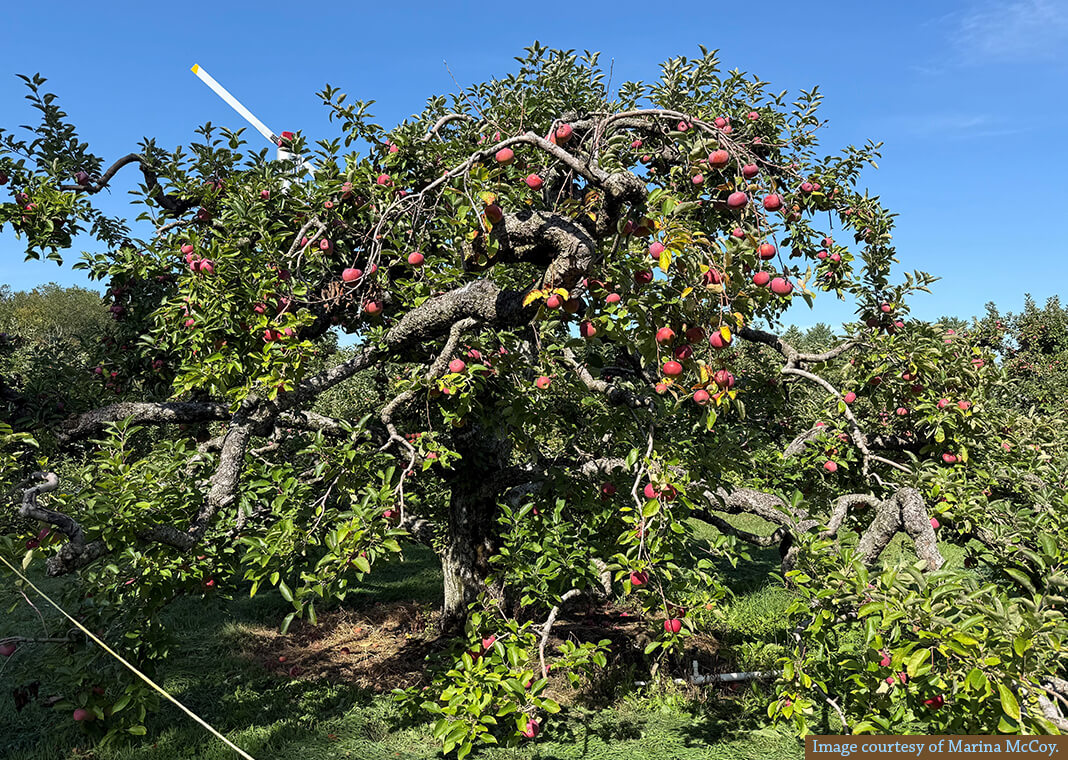
Each year my family and I enjoy going apple picking together here in New England. Yes, I know that I could just as easily buy these apples at the local orchard, and no, I don’t always know what to do with all the apples that we bring home once I’ve made apple crisp, my husband has baked apple bread, and we pack an apple daily in our lunches. But the fun is in going out into the orchard to choose them as much as in the delightful crunch and intensely fresh taste of a newly picked apple.
If we head out early enough in the day, there are plentiful apples in easy reach, but it’s that out-of-reach apple that often beckons. Surely the apples on an upper branch of the tree—the ones up there that require setting up the ladder, while we spot one another and hold the ladder—are the ones that will be best. I remember one year I thought that while the biblical story of Adam and Eve being tempted by fruit does not specify a kind, it made sense that artists have often portrayed the apple as that enticing fruit. After all, sometimes I have climbed that ladder and found that the apple is just out of reach. It may be human nature to think that the good that we don’t yet have is the choicest fruit. Human beings seem made to strive and to seek, not to settle.
Moreover, St. Ignatius made clear that desire for what we want is not itself sinful. We desire many good things: love, meaningful work, or social goods, such as peace and justice. Some of these are available to us, and others may be still out of reach. So when that “apple” is in our sight, but we do not yet possess it, how do we approach getting there?
Ignatian spirituality offers a solid set of tools for undertaking discernment. Now I should be clear that, of course, it’s not always choosing the most difficult path available or the thing that is most out of reach that is where God leads us. Sometimes, Ignatius says, the path is clear to us. For example, I always knew that I wanted to be married and be a mom. It’s not that no other alternative ever occurred to me, but rather that deep in my heart, I knew this was a way that I wanted to live and felt called to live. It aligns with some of my deepest desires. That “choice fruit” was easy to see.
Yet many other desires that are authentically from God do seem out of reach, at times. For example, I want a world in which peace and justice are at the core of political life, and yet that goal can at times feel far away. Moreover, I am not God and therefore cannot singlehandedly help the world to reach peace! Therefore, I have to discern between real alternatives that are available to me as a mom, teacher, and city-dweller as to how I can contribute to these goods. How can I, where I am situated here and now, work for peace or for justice? Ignatius thought that since we all have unique gifts and talents, how those play out in God’s vision for the world will be different in each person. God creates each one of us individually.
Ignatius advocated having a heart open to God’s will and being free to choose, that is, not weighed down by attachments to what others think or to financial considerations. Rather, we choose what is for God’s greater glory and pay attention to our interior experiences. We also need to have thoughtful conversations with others to decide wisely. If I want to address hunger or poverty in my community, I had better not discern how to do that alone. Rather, I need to talk to people who are themselves poor or hungry and make part of my discernment the wisdom that they offer on these topics. My own desires and conversations in prayer with God matter, but so do the voices of others.
When I go apple picking, at times my husband spots me as I climb the ladder, and we decide together which varieties to choose. As we strive for those larger goals that we feel called to pursue, it is good to have others with whom we discern and provide mutual support, for they too are enlivened by the presence of God.

Thanks Marina for this beautiful article on discernment and the courage to move ahead. The exercise of discernment done in the company of more than oneself does fetch better fruit. Of course it calls for transparency, respect, dialogue, and justice.
I also knew all my life that all I wanted was to be a wife and mom. But my prayers were not answered and I was deprived of this privilege which so many women achieve without even trying. I have been saddened and depressed by this all these years, even now over 70. I will never understand why I was not allowed to know these emotions, love of a husband and child, my love for home making, etc., and now am still left in my older years with this question and sometimes resentment and bitterness.
Love the article.
Beautiful